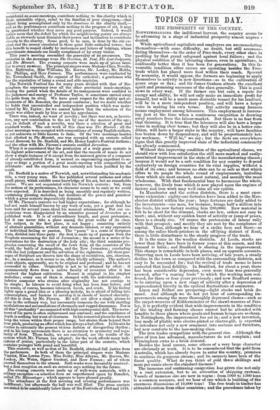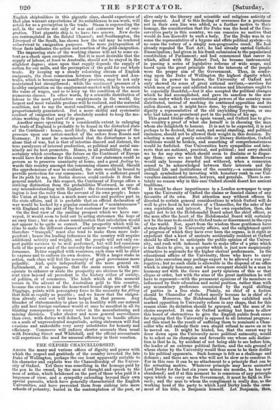TOPICS OF THE DAY.
THE PROSPERITY OF THE COUNTRY.
NOTWITHSTANDING the indifferent harvest, the country seems to be advancing in a stage of industrial prosperity almost unpree dented.
While agricultural capitalists and employers are aocommodating themselves—with some difficulty, no doubt, but still aCCOMMO. dating themselves—to the order of Free-trade, every other class is profiting by that grand safeguard against local failure ; and the physical condition of the labouring classes, even in agrienIture, is confessedly better than it has been for generations. In this fa- vourable condition other causes are operating besides the Free- trade which has placed more food within their reach. Spurred by necessity, it would appear, the farmers are beginning to apply themselves to aotivity in new direotions—as in the cultivation of green crops or flax; and Sir James Graham attests the excellent spirit and promising successes of the class generally. This is good news in every way. If the farmer can but earn a repute for energy and ability, he will not only make an immediate profit for himself, but will be a much more desirable tenant for his landlord, will be in a more independent position, and will have a larger voice in making his own terms. But activity among farmers means employment among-labourers. This employment is increas- ing just at the time when a continuous emigration is drawing away numbers from the labour-market. But there is no fear from that thinning. It is true that the labourers will also have a larger voice in making their terms • but they will also be in a better con- dition, will have a larger stake in the country, will have faculties less beaten down by despondency, and will be proportionately bet- ter workmen. " Will be," we say; but the facts are everywhere signs that this greatly improved state of the industrial community has already commenced.
Without this improving condition of the agricultural classes, we should view with less satisfaction the still more marked and easily- ascertained improvement in the state of the manufacturing classes ; because it would not be a safe condition for any country to depend exclusively on foreign countries for its vital supplies, without a field of its own; and because no state can be so safe as that which offers to its people the whole round of employments, including those which are moat ancient, most natural, and morally the most wholesome. With that fundamental base to harmonize the whole, however, the lively tune which is now played upon the engines of factory and iron work may well raise all our spirits.
In Manchester and the cotton districts, there is a most enor- mous extension : eighty-one factories have been added to the Man- chester district within the year ; large fortunes are daily added to the investments—one man, for instance, brings half a million into the trade, his new factory costing him 200,0001. Raw material is felt to be short for the demand, stocks are low, orders not easy to meet ; and, without any sudden burst of activity or jump of prices, there is a steady rise. Of course the pretensions of labour rally with that prospect; and mostly they are met by the compliance of capital. Thus, although we hear of a strike here and there—as among the calico block-printers in the off-lying district of Kent, there is little disturbance to the steady progress of the trade.
It is the same in the woollen districts. At Leeds, stooks are lower than they have been in former years at this season, and the demand is brisk ; and Bradford is sharing in the improvement. This change is remarkable in both places, and on opposite accounts. Observing men in Leeds have been noticing, of late years, a steady decline in the town as compared with the surrounding districts, not easy to be accounted for ; but the revival of trade seems to have corrected that local debility. In Bradford, for about a year, there has been considerable depression, even more than was generally avowed, after " a roaring trade" to which the working men con- fessed, for three or four years previously ; and now Bradford seems to be entering upon a new stage of activity after a depression of unprecedented brevity in the cyclical fluctuations of commerce. Linen and Belfast are prospering—light stocks and brisk de- mand. And although we do not yet hear of corresponding im- provements among the more thoroughly depressed classes—such as the carpet-weavers of Kidderminster or the shawl-weavers of Pais- ley, it is perfectly evident that wide improvements in the condition of the trading and farming classes cannot but be attended with benefits to those places where goods and human beings are so cheap. In Nottingham the improvement has set in ; and a new invention, lace made of pliable wire electro-plated or electro-gilt, is expected to introduce not only a new ornament into costume and furniture, but new comforts to the lace-making class. The iron trades sympathize with the general rise. Although the price of iron has advanced, manufacturers do not complain; and Birmingham owns to a brisk demand. Besides the local causes, some others of a vffy large character are obviously at work. It is to be remembered that the gold from Australia, which has already begun to enter the country, promises to continue its gorgeous stream ; and its earnests have been of the finest quality. What do you think of gold three shillings and more per ounce above the standard fineness ? The immense and continuing emigration has given rise not only to a vast extension, but to an alteration of shipping systems. Vessels of immense size are now in vogue : from 1000 to 1600 tons is a common measure, and we hear of one which is building of the enormous dimensions of 10,000 tons! The free trade in timber has attracted custom from other countries; and the precedence taken by English shipbuilders in this gigantic class, should experience of that plan warrant expectations of its suitableness to sea-work, will retain for us a preemption in the trade. Steam is superseding the sail, in the service not only of war and commerce but of emi- gration. That gigantic ship is to have two screws. New docks are contemplated in the Bristol Channel; and Southampton, the Liverpool of the South, has shown how the rail may be rendered subservient to emigration purposes. The 'mere juxtaposition of these facts indicates the action and reaction of the gold-emigration.
The improving state of the working classes will act to some ex- tent as a check upon emigration. But it is most desirable that the supply of labour, at least to Australia, should not be stayed in the slightest degree; since upon that supply depends the supply of cotton for our mills, and the preemption of the gold for our whole trade. By keeping up a steady colonizing stream of English emigrants, the close connexion between this country and Aus- tralia, which is becoming so manifestly precious, may be not only maintained but strengthened; while the continued pressure of a healthy emigration on the employment-market will help to sustain the value of wages, and so to keep up the condition of the most numerous classes. In other words, by a scientific distribution of labour to the most productive employments in the world, the largest and most valuable produce will be realized, and the material condition, not to say the moral condition, of great communities, proportionately guaranteed. But a more skilful and systematic conduct of emigration may be absolutely needed to keep the ma- chine working in that part of its gear.
Another cause operating to a considerable extent in enlarging the trade of England is probably to be found in the disturbed state of the Continent : hence, most likely, the unusual degree of the pressure upon our cotton-market of the orders from Russia and Germany. It must be remembered that the disturbance is not alone that of war, but is that of intestine discord and distrust, the true paralyzers of internal production, as political and social una- nimity are its best promoters. Hence, in all probability, that un- certainty which overhangs the future on the Continent of Europe would have few alarms for this country, if our statesmen could so govern as to preserve unanimity at home, and a good feeling to- wards this country amongst the consuming classes abroad. Should the apprehensions of war be realized, the state would be bound to provide protection for our commerce; but with a sufficient guard for its path by sea, no Berlin decrees could exclude it from the general market. In this respect, the Continent of Europe offers a striking distinction from the probabilities Westward, in case of any misunderstanding with England : the Government at Wash- ington is less the ruler than the servant of its own people ; hence the Union at large takes a much more active and positive part in the state affairs, and it is probable that an official declaration of war would be backed by a popular resolution of " nonintercourse " with England on the part of the best customer for our trade.
On the first view of the smiling prospect which we have sur- veyed, it would seem to hold out to acting statesmen the hope of an easy time ; but on a closer consideration that calculation would not appear to be quite so correct. The prosperity which will in- cline to make the different classes of society more " contented," and. therefore " tranquil," must also tend to make them more inde- pendent ; hence the leading influences in the country will acquire additional activity and weight, and the people will not only ex- pect public services to be well performed, but will feel conscious both of the power and of the necessity for exacting a sufficient per- formance. Better supplied with resources, each class will be abler to express-and to enforce its own desires. With a larger stake in action, each class will feel the necessity of good governance more palpably. And, quite independently of the more general en- lightenment, it so happens that the main causes which will operate to enhance or abate the prosperity are obvious to the pre- sent view beyond all precedent in the history either of society, of politics, or of commerce. The hitch which at this moment occurs in the advent of the Australian gold to this country, because the crews to man the homeward-bound ships are off to the Diggings, points with peremptory force to the necessity for filling that field as rapidly as possible ; and we know that the emigra- tion already sent out will have helped in that process. Any blunder of statesmanship to place us in hostility with our natural ally and best foreign customer would at once be manifest in all its blasting consequences to every voter in the manufacturing and mining districts. Under clearer and more general surveillance than ever, with duties well defined, but having to handle affairs on a scale of unprecedented magnitude, acting statesmen will find evasions and makeshifts very sorry substitutes for honesty and efficiency. Commerce will enforce shorter accounts than usual with Downing Street and Whitehall, and the official accountants will experience the need for unusual efficiency in their vocation.



























 Previous page
Previous page